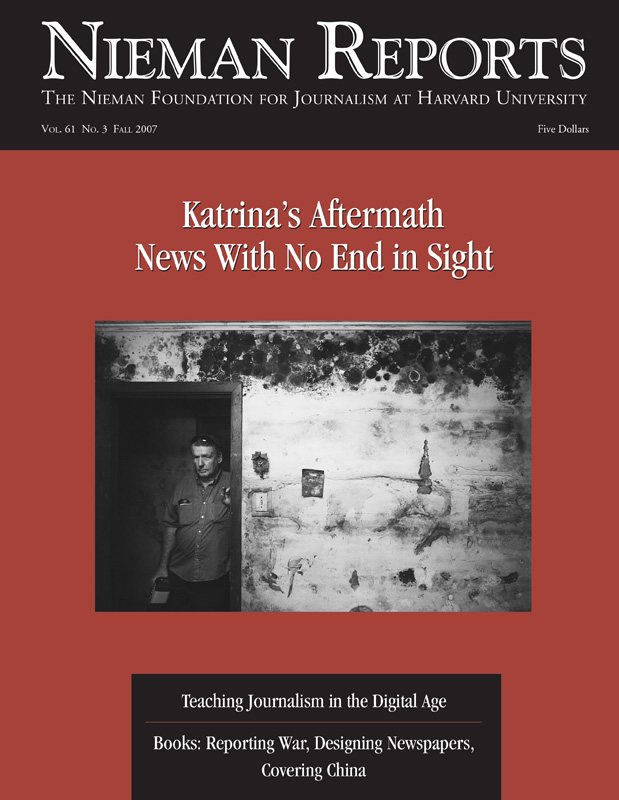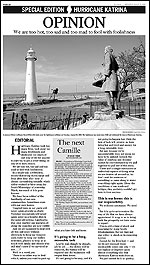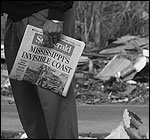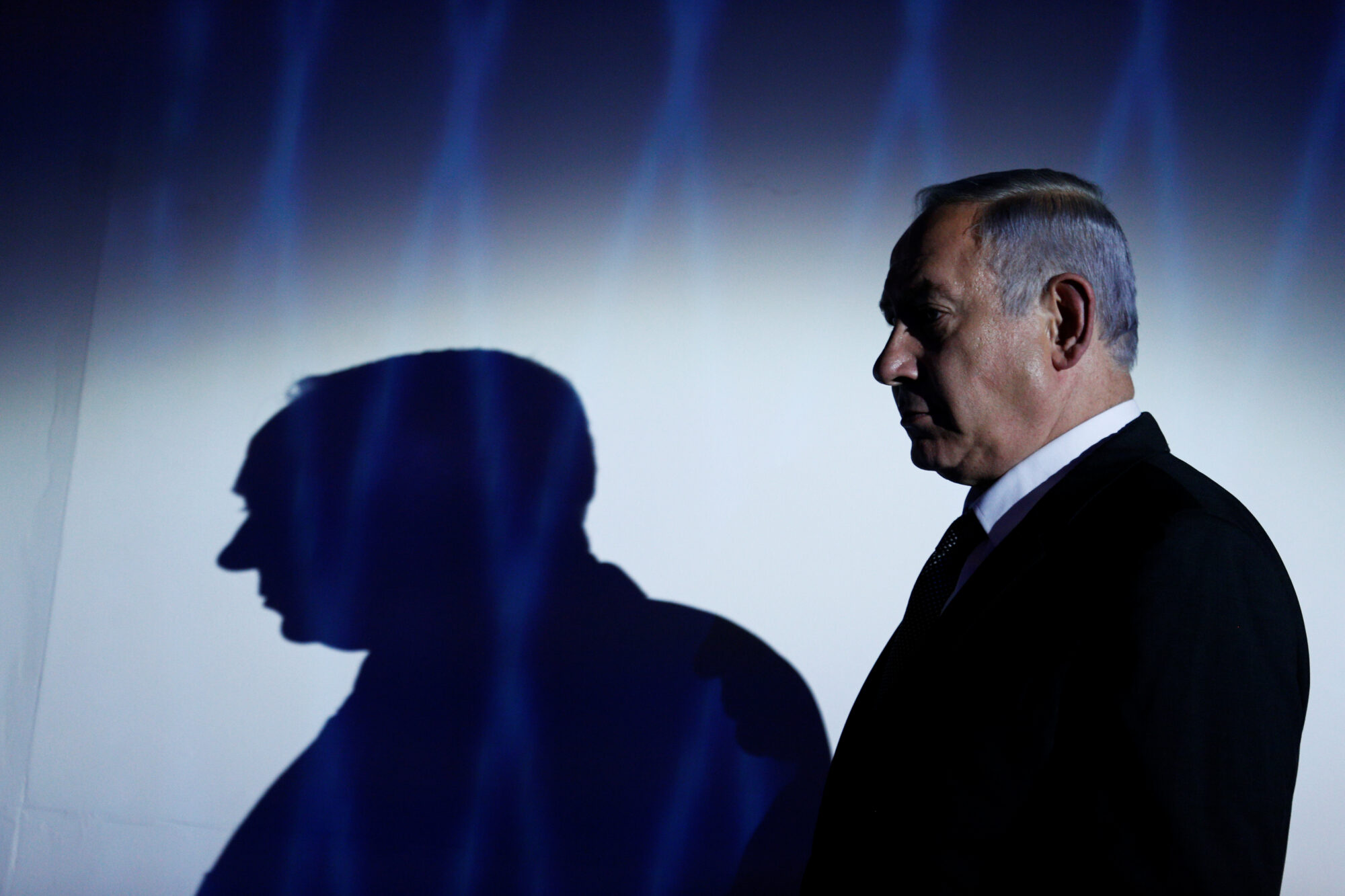A few weeks after Hurricane Katrina, Biloxi Mayor A.J. Holloway guided a group of U.S. senators through his devastated city. At one point, Senator John Warner pulled the mayor aside and said, “Mayor Holloway, I’m an old man. I’ve been through three wars and five wives, but I’ve never seen anything as bad as this.”
My experience is a bit more limited than the senator’s. I’ve been through only one war and three wives. But, like him, I had never seen anything as bad as Katrina. And I have never written so much about anything as Katrina — with no end in sight.
Long before Katrina started heading our way, late in August 2005, the Sun Herald had already paid more editorial attention to hurricanes than we usually do. Even now, our numerous appeals to South Mississippians to be prepared for a storm in the summer of 2005 are eerily prescient. And after our newspaper published the editorial “The Power of Prayer and Plywood” on the eve of the storm, Katrina became the only topic of our editorials for months and will remain the primary focus of our paper’s voice for many years more.
When an event alters a community to the extent that Katrina changed ours, the time it takes to recover can be as staggering as the catastrophe itself. While few news stories endure as long as this one has, the consequences of many events do tend to linger longer than we might imagine they could. A bit of what we’ve learned in editorializing about this one might be useful for that time when a story in your community refuses to go away. A few quick, all-encompassing pieces of advice come first, followed by some experiences we’ve had:
The only thing quick about a catastrophe is the time it takes to occur. For those who survive, everything else seems to take forever. So at appropriate intervals, review the course of events and refresh your interpretations and recommendations. As for recommendations, don’t expect perfection, either from yourself or others. And be prepared to make, or at least evaluate, recommendations as never before.
We have yet to run out of Katrina-related editorial material. In the beginning, there were the obvious issues of survival. Then there were the obstacles to recovery. Now there are the seemingly never-ending subjects of affordable insurance coverage — and affordable housing — and rebuilding. And if your audience is, like ours, split among multiple jurisdictions, then your editorials will be, too. You will praise those counties and cities that learn quickly and do the right thing right away. You will encourage other counties and cities to follow the example of others.
This requires patience, especially in an area such as ours, which just can’t wait to get back to being laid back. Jimmy Buffett is, after all, one of our own. We live for the day when we have to dig deep for a Katrina-related editorial topic. Two years after the storm, that day has yet to dawn.
For all the praise and thanks to be heaped on first responders (of which those of us at the newspaper are one, by the way) and volunteers, there is much that can and should be criticized about the handling of anything on the scale of Katrina. Panic and chaos undermine planning and preparations. Katrina humbled many a proud individual and institution. So pick and choose the objects of your criticism carefully. For instance, just days after Katrina, one of our reporters observed personnel at Keesler Air Force Base in Biloxi playing basketball on base. Why, we opined, weren’t those troops “exercising” out in the community? They could get plenty of exercise by helping with debris removal, for instance. It was months later that we learned that those troops were in fact temporarily assigned to Keesler as students and were on a tight training schedule. Their presence represented Keesler restoring at least part of its mission. What we saw as a negative — out of context due to the poor communications after the storm — was in fact a positive sign.
Be wary, too, of the extraordinary becoming routine. Just because daily contact causes you to become familiar with shattered lives and a littered landscape, do not allow that familiarity to deaden your senses to the outrageous and the exceptional. The outrageous: Katrina left us surrounded by rubble and consequently deadened our sensitivity to trash and litter. We took too long to distinguish between property owners legitimately waiting on debris removal contractors and property owners who simply did not care about the condition of their lots. The exceptional: We were, and continue to be, blessed with volunteers in our communities. While we can never say thank you enough, we have made many efforts to convey our gratitude.
If this sounds too humdrum for the institutional voice of your publication, I would suggest that no matter how reasonable and rational and erudite your editorials may once have seemed, anything that does not have a practical application appears pompous in print in the aftermath of genuine disaster and tragedy.
Luckily, pomposity wilts around port-a-potties. Port-a-potties? Yes, port-a-potties. Back in the days when there was no time for the editorial board to conduct its regular discussions, I soon discovered that I could touch base with the publisher about the next day’s editorial as we were on the way to and from the long line of port-a-potties behind our building. This arrangement was not perfect, but then nothing else was, either.
Keeping Our Voice Vital
The Sun Herald never missed a day of publication due to Katrina because we had arranged to print the newspaper in Georgia and truck it to the Mississippi Gulf Coast. But this arrangement did not permit Editorial Page Editor Marie Harris and me to edit and design the opinion page. Not that there always was an entire page devoted solely to opinion. An editorial was usually the only opinion piece in the newspaper during those first weeks after the storm. It could land at the top, bottom or down the side of any page — including the front page on one occasion.
As the newspaper resumed a more familiar layout, it still took some time before the regular run of commentary returned to the opinion page. And we have yet to regain our old share of the news hole. But we cope and hope that egos — inside and out of the newsroom — will not get in the way.
Along the way, do not discount the need for the “stiff upper lip” editorial. It serves a legitimate need. Just don’t overdo it. Don’t demand too much flag-waving from people with broken arms — or hearts. And don’t underestimate the resilience of your readers. There is power in the printed word, and people will respond when your editorial voice is raised on their behalf.
One of the more difficult editorials in the aftermath of Katrina called on the mayor of one of the 11 cities that line the coast of Mississippi to resign. He simply was not up to the challenge of leading his community out of this disaster. Within days of the editorial, he announced he would step down. Many of his constituents quietly thanked us for providing the necessary nudge.
Of course, some people cannot be nudged — or even shoved — in the right direction. We view this year’s statewide elections as our only relief from the deadheaded officials in control of Mississippi’s Department of Transportation who are convinced there is no transportation problem that asphalt cannot solve. And it might take the next round of municipal elections (still two years away) to fill some city halls with the vision necessary to seize opportunities that rebuilding on this scale presents.
Within a week of Katrina, Ricky Mathews, the publisher of the Sun Herald, assembled a group of state and local officials from the public and private sectors to help set a course for South Mississippi’s recovery. The plans and possibilities that grew out of that gathering have helped set the agenda of the newspaper’s editorials ever since.
We know that our editorial voice has been a steadfast part of the recovery conversation from the beginning. We hope that it will remain a trustworthy part of it until the end.
Tony Biffle is the associate editor of the Sun Herald in Biloxi/Gulfport, Mississippi.
My experience is a bit more limited than the senator’s. I’ve been through only one war and three wives. But, like him, I had never seen anything as bad as Katrina. And I have never written so much about anything as Katrina — with no end in sight.
Long before Katrina started heading our way, late in August 2005, the Sun Herald had already paid more editorial attention to hurricanes than we usually do. Even now, our numerous appeals to South Mississippians to be prepared for a storm in the summer of 2005 are eerily prescient. And after our newspaper published the editorial “The Power of Prayer and Plywood” on the eve of the storm, Katrina became the only topic of our editorials for months and will remain the primary focus of our paper’s voice for many years more.
When an event alters a community to the extent that Katrina changed ours, the time it takes to recover can be as staggering as the catastrophe itself. While few news stories endure as long as this one has, the consequences of many events do tend to linger longer than we might imagine they could. A bit of what we’ve learned in editorializing about this one might be useful for that time when a story in your community refuses to go away. A few quick, all-encompassing pieces of advice come first, followed by some experiences we’ve had:
- Accept, as soon as possible, that nothing will get back to normal anytime soon.
- Beware of fatigue—your own and your readers’.
- Keep in mind that no one editorial will say all that needs to be said. Or will be read by all who need to read it. So break it down. Sort it out. Put it in print—again and again.
The only thing quick about a catastrophe is the time it takes to occur. For those who survive, everything else seems to take forever. So at appropriate intervals, review the course of events and refresh your interpretations and recommendations. As for recommendations, don’t expect perfection, either from yourself or others. And be prepared to make, or at least evaluate, recommendations as never before.
We have yet to run out of Katrina-related editorial material. In the beginning, there were the obvious issues of survival. Then there were the obstacles to recovery. Now there are the seemingly never-ending subjects of affordable insurance coverage — and affordable housing — and rebuilding. And if your audience is, like ours, split among multiple jurisdictions, then your editorials will be, too. You will praise those counties and cities that learn quickly and do the right thing right away. You will encourage other counties and cities to follow the example of others.
This requires patience, especially in an area such as ours, which just can’t wait to get back to being laid back. Jimmy Buffett is, after all, one of our own. We live for the day when we have to dig deep for a Katrina-related editorial topic. Two years after the storm, that day has yet to dawn.
For all the praise and thanks to be heaped on first responders (of which those of us at the newspaper are one, by the way) and volunteers, there is much that can and should be criticized about the handling of anything on the scale of Katrina. Panic and chaos undermine planning and preparations. Katrina humbled many a proud individual and institution. So pick and choose the objects of your criticism carefully. For instance, just days after Katrina, one of our reporters observed personnel at Keesler Air Force Base in Biloxi playing basketball on base. Why, we opined, weren’t those troops “exercising” out in the community? They could get plenty of exercise by helping with debris removal, for instance. It was months later that we learned that those troops were in fact temporarily assigned to Keesler as students and were on a tight training schedule. Their presence represented Keesler restoring at least part of its mission. What we saw as a negative — out of context due to the poor communications after the storm — was in fact a positive sign.
Be wary, too, of the extraordinary becoming routine. Just because daily contact causes you to become familiar with shattered lives and a littered landscape, do not allow that familiarity to deaden your senses to the outrageous and the exceptional. The outrageous: Katrina left us surrounded by rubble and consequently deadened our sensitivity to trash and litter. We took too long to distinguish between property owners legitimately waiting on debris removal contractors and property owners who simply did not care about the condition of their lots. The exceptional: We were, and continue to be, blessed with volunteers in our communities. While we can never say thank you enough, we have made many efforts to convey our gratitude.
If this sounds too humdrum for the institutional voice of your publication, I would suggest that no matter how reasonable and rational and erudite your editorials may once have seemed, anything that does not have a practical application appears pompous in print in the aftermath of genuine disaster and tragedy.
Luckily, pomposity wilts around port-a-potties. Port-a-potties? Yes, port-a-potties. Back in the days when there was no time for the editorial board to conduct its regular discussions, I soon discovered that I could touch base with the publisher about the next day’s editorial as we were on the way to and from the long line of port-a-potties behind our building. This arrangement was not perfect, but then nothing else was, either.
Keeping Our Voice Vital
The Sun Herald never missed a day of publication due to Katrina because we had arranged to print the newspaper in Georgia and truck it to the Mississippi Gulf Coast. But this arrangement did not permit Editorial Page Editor Marie Harris and me to edit and design the opinion page. Not that there always was an entire page devoted solely to opinion. An editorial was usually the only opinion piece in the newspaper during those first weeks after the storm. It could land at the top, bottom or down the side of any page — including the front page on one occasion.
As the newspaper resumed a more familiar layout, it still took some time before the regular run of commentary returned to the opinion page. And we have yet to regain our old share of the news hole. But we cope and hope that egos — inside and out of the newsroom — will not get in the way.
Along the way, do not discount the need for the “stiff upper lip” editorial. It serves a legitimate need. Just don’t overdo it. Don’t demand too much flag-waving from people with broken arms — or hearts. And don’t underestimate the resilience of your readers. There is power in the printed word, and people will respond when your editorial voice is raised on their behalf.
One of the more difficult editorials in the aftermath of Katrina called on the mayor of one of the 11 cities that line the coast of Mississippi to resign. He simply was not up to the challenge of leading his community out of this disaster. Within days of the editorial, he announced he would step down. Many of his constituents quietly thanked us for providing the necessary nudge.
Of course, some people cannot be nudged — or even shoved — in the right direction. We view this year’s statewide elections as our only relief from the deadheaded officials in control of Mississippi’s Department of Transportation who are convinced there is no transportation problem that asphalt cannot solve. And it might take the next round of municipal elections (still two years away) to fill some city halls with the vision necessary to seize opportunities that rebuilding on this scale presents.
Within a week of Katrina, Ricky Mathews, the publisher of the Sun Herald, assembled a group of state and local officials from the public and private sectors to help set a course for South Mississippi’s recovery. The plans and possibilities that grew out of that gathering have helped set the agenda of the newspaper’s editorials ever since.
We know that our editorial voice has been a steadfast part of the recovery conversation from the beginning. We hope that it will remain a trustworthy part of it until the end.
Tony Biffle is the associate editor of the Sun Herald in Biloxi/Gulfport, Mississippi.





